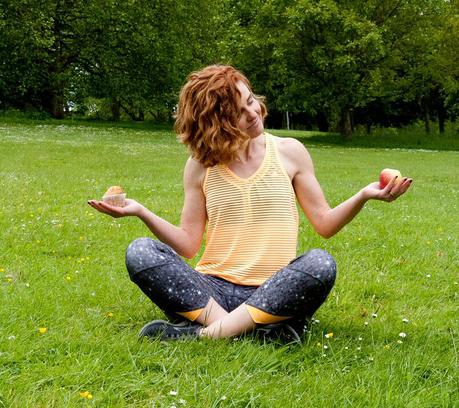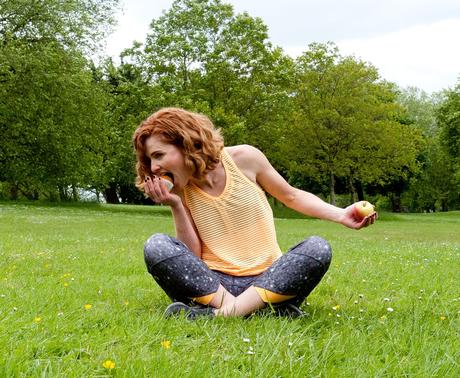
It's never nice to say, "I told you so". But here's the thing - I told you so. Four years ago I became aware of a troubling movement in fitness circles known as clean eating. I blogged about it and hoped everyone would get over themselves (or at least run out of avocados). Sadly neither happened and the clean eating phenomenon has grown and grown.
Until now, that is. In the last year there's been a whiff of change in the air. Tiring of the endless feel-good lectures and eager to move on to the next trend, journalists have started to reject clean and look for an alternative. And sensing a backlash, fitness bloggers have started to change, too. In between posting artfully-arranged plates of kale-laden goodness,they have waved slices of pizza at us and assured us that really, they got those abs by practising balance and not by going hungry or saying no to chips. They've replaced #thinspo and #fitspo with the equally guilt-inducing phrase #strongnotskinny and their new year posts invariably insisted that fitness was all about fun, balance and moderation rather than self-improvement.
Anyway, last night in BBC2's Horizon documentary, "Clean Eating, the Dirty Truth", a bona fide scientist, Dr Giles Yeo - a geneticist from the University of Cambridge - put a bomb under the clean eating trend. He took a handful of authors who promote clean eating and examined the science behind their claims. What emerged was that there's definitely a formula. It goes like this. Older, unattractive man (typically American) develops a dietary theory, based on limited, flawed or no scientific evidence, and gives it a scientific veneer. For some years his book is pioneered by a devoted (yet insufficiently goodlooking) group of acolytes, and nobody pays it much attention. Then one day his book is taken up by a young, gorgeous female blogger with glossy hair, a shiny kitchen and great lighting who presents it as part of the secret to her desirable lifestyle. BOOM! A movement is born.
Yeo interrogated the various healthy eating gurus, prompting concessions from some and swivel-eyed pronouncements from others. Deliciously Ella made an appearance, insisting that she wasn't making any health claims for her philosophy beyond the fact that vegetables are good for you. It was perhaps a little disingenuous - in her early days she did promote the healing properties of her diet and did claim that it had made her well again. Her first book said in terms that it was preferable for everyone to eat less gluten. Maybe her PR people foresaw the backlash, maybe as her brand has grown she's realised she needs to take the science more seriously. Or maybe, now married to a pizza-eater and experiencing something of a health relapse herself, she has genuinely moderated her views. Whatever - the point is she showed up and made her case, and was entirely reasonable and responsible. Kudos to her for doing that. The others - the Hemsley sisters and Natasha Corrett - refused to appear, each merely releasing a bland statement in the hope, no doubt, that their critics would back off and they could go back to posting pictures on Instagram.
For the moment, the backlash is well and truly under way. The same bloggers who earlier in the week were posting pictures from the launch of a cookbook by someone who styles herself Clean Eating Alice, were busy on Twitter praising the show and promoting balance. But let's not imagine it's all over. There's just been a tremor in the force - little more. Those same bloggers will still be showcasing their fabulous lifestyle and promoting their lovely physiques for all they're worth. Because that's what sells. That's what gets you those much-needed likes. Even those whose USP is to slam the hypocrisy of the industry use the #eatclean, #fitfam and #strongnotskinny hashtags and illustrate their posts with pictures of their toned abdominals. And who can blame them? That's what the sponsors want. And neuroscientists have shown that you get a little shot of dopamine every time a "like" flashes up on your screen.
But does any of it matter? Can't we just leave them all in their little healthy bubble? Well, no. It really does matter. Because these beautiful young people are having a direct effect on the impressionable minds of young people. It's not enough for Ella Mills to say vaguely, "we're all responsible" as if it's not really her problem. It's a huge problem. Promoting any sort of restricted diet alongside images of a so-called "perfect body" is a toxic and dangerous combination to anyone with a propensity for eating disorders. And eating disorders kill. One in four patients with anorexia dies. One in four.
So let's keep it scientific and evidence-based. Let's eat nutritious food. Let's exercise. Let's eat our vegetables. Just don't let's make a whole lifestyle out of it. And if someone offers you a chocolate chip muffin, unless you're actually allergic to it, for pity's sake just eat it.


